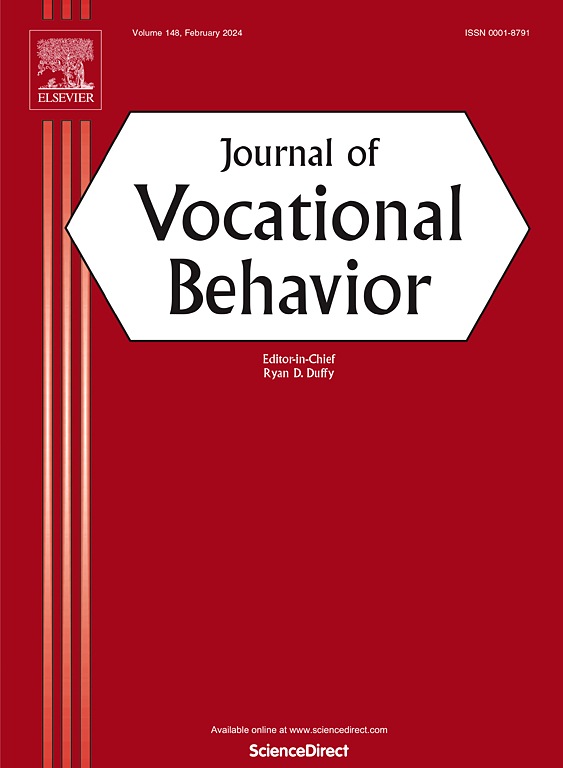The sum is larger than its parts: The daily interplay of leader and colleague support in facilitating employee well-being through balanced needs satisfaction and positive affect
IF 5.2
1区 心理学
Q1 PSYCHOLOGY, APPLIED
引用次数: 0
Abstract
Previous research drawing on the Self-Determination Theory has demonstrated that the satisfaction of each basic psychological need for autonomy, competence, and relatedness exhibits unique positive effects on employee well-being independent of the satisfaction of the other needs (i.e., additive hypothesis). In comparison, more recent theorizing has suggested taking a more holistic view of needs satisfaction by proposing that the equal satisfaction of each need relative to the other needs contributes to wellbeing beyond the overall satisfaction of the three needs (i.e., balance hypothesis). The present study aims to expand our understanding of the balance hypothesis. We propose that leader and colleagues’ support jointly contribute to balanced needs satisfaction, which promotes positive affect that in turn enriches home-domain wellbeing (i.e., subjective vitality). We integrate Self-Determination Theory and the Work-Home Resources model to suggest that beyond the satisfaction of each independent need, balanced needs satisfaction serves as a mechanism linking workplace support to the transfer of volatile energetic resources (positive affect) across domains. A diary study across 10 workdays with N=85 employees offers support for our research model as we find that joint leader and colleague support are indirectly related to home-domain subjective vitality via the balanced satisfaction of the basic psychological needs and positive affect. Supplementary analysis using Latent Profile Analysis (LPA) further corroborates the distinct contribution of balanced needs satisfaction to well-being. We subsequently discuss the theoretical and practical implications of our findings.
整体大于部分:通过平衡需求满足和积极影响,领导和同事的日常支持在促进员工福祉方面的相互作用
先前基于自我决定理论的研究表明,对自主性、能力和相关性的每一种基本心理需求的满足对员工幸福感都表现出独特的积极影响,而不依赖于其他需求的满足(即加性假设)。相比之下,最近的理论建议对需求满足采取更全面的观点,提出每个需求相对于其他需求的平等满足有助于超越三个需求的总体满足(即平衡假设)的幸福。本研究旨在扩大我们对平衡假说的理解。我们建议领导和同事的支持共同促进平衡的需求满足,从而促进积极的影响,从而丰富家庭领域的幸福感(即主观活力)。我们整合了自我决定理论和工作-家庭资源模型,表明除了每个独立需求的满足之外,平衡需求满足作为一种机制,将工作场所支持与挥发性能量资源(积极影响)跨领域转移联系起来。一项包含85名员工的10个工作日的日记研究为我们的研究模型提供了支持,我们发现共同领导和同事支持通过基本心理需求和积极影响的平衡满足间接与家庭领域主观活力相关。使用潜在剖面分析(LPA)的补充分析进一步证实了平衡需求满足对幸福感的独特贡献。我们随后讨论了我们的发现的理论和实践意义。
本文章由计算机程序翻译,如有差异,请以英文原文为准。
求助全文
约1分钟内获得全文
求助全文
来源期刊

Journal of Vocational Behavior
PSYCHOLOGY, APPLIED-
CiteScore
13.10
自引率
5.40%
发文量
85
期刊介绍:
The Journal of Vocational Behavior publishes original empirical and theoretical articles offering unique insights into the realms of career choice, career development, and work adjustment across the lifespan. These contributions are not only valuable for academic exploration but also find applications in counseling and career development programs across diverse sectors such as colleges, universities, business, industry, government, and the military.
The primary focus of the journal centers on individual decision-making regarding work and careers, prioritizing investigations into personal career choices rather than organizational or employer-level variables. Example topics encompass a broad range, from initial career choices (e.g., choice of major, initial work or organization selection, organizational attraction) to the development of a career, work transitions, work-family management, and attitudes within the workplace (such as work commitment, multiple role management, and turnover).
 求助内容:
求助内容: 应助结果提醒方式:
应助结果提醒方式:


